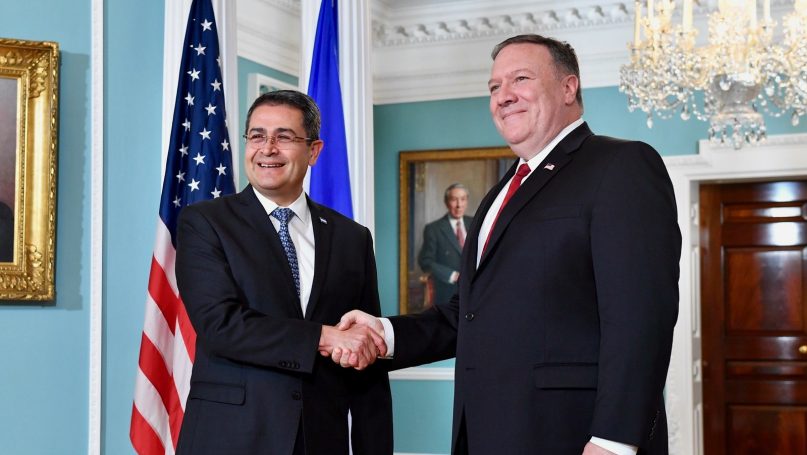
“You want to reduce illegal immigration? Then support real democracy in Honduras, stop legitimizing fraud!” is a sign held by a protester in front of the United States Embassy in Honduras, as a response to the 2017 election fraud in the country. The U.S. demands a decrease in immigration from Central America; however, it does not acknowledge the role its foreign policy plays in deteriorating the already fragile and dangerous situation that Central American countries face. Most of the immigrants and asylum seekers coming to the U.S. are from the Northern Triangle Region of Honduras, El Salvador, and Guatemala. My home country of Honduras, among the three, has the highest immigration rate.
In the U.S., national discussions continue regarding the inhumane and deeply troubling conditions of migrant detention centers. Treatment of migrants and asylum-seekers continue to worsen even under COVID-19, in which deportations continue, even of unaccompanied minors, and migrants in detention centers do not have proper access to health care, among other concerns. The U.S. – Mexico border has been a humanitarian crisis hotspot, which continues to worsen due to the implementation of the Migrant Protection Protocols (MPP), also known as, the “Remain in Mexico” policy. This is a U.S. policy that forces immigrants and asylum seekers, mostly from the Northern Triangle Region, to wait indefinitely in Mexico for the duration of their immigration procedures such as asylum-seeking cases.
A decrease in immigration would not occur as long as the current U.S. foreign policy towards the Northern Triangle region remains the same. Particularly to Honduras, the U.S. is providing military and security funding to a government deeply involved in corruption and drug trafficking. The U.S. should recognize that human rights violations by the military occur on a daily basis in Honduras, funded by U.S. taxpayer money. H.R. 1945 The Berta Caceres Human Rights in Honduras Act calls for a temporary suspension to U.S. funding for military aid in Honduras until the human rights situation is addressed and violators are brought to justice. The bill is not a panacea to the difficult situation in Honduras. However, if we really want to start tackling root causes of immigration and reducing the number of migrants to the U.S., a good start would entail serious consideration and adoption of this bill.
Militarization has been the main approach for the Honduran President Juan Orlando Hernandez (commonly referred to as JOH) to cement his power. In 2016, JOH illegally altered the constitution to pursue a second presidential term. This resulted in massive protests, which the JOH administration violently tried to put down through the use of military force. The government, along with transnational corporations has targeted human rights and environmental defenders, making the country extremely dangerous for activists, as reported by Global Witness in 2017. The government has also turned into a narco-state in which public officials at various levels have been participating in the illicit drug business, including the president’s brother, a former congressman, who is currently imprisoned in New York. JOH himself has previously been under investigation by the U.S. Drug Enforcement Agency for ‘large-scale drug-trafficking and money laundering activities relating to the importation of cocaine into the United States.’
The current situation in Honduras results in a country in which drug trafficking and the ongoing militarization create a hostile and dangerous environment for peaceful living and human flourishing. Additionally, the current state of affairs facilitates corruption, breeds violence and crime, and endangers easily targeted, at-risk populations such as women, indigenous people, and the LGBTQ community. Millions of Hondurans work in the informal economy without proper salaries and benefits. The health system is failing due to lack of resources, which were previously stolen by the government officials belonging to the National Party to fund JOH’s political campaign. Hondurans who own small and medium-sized businesses are subjected to war tax, assaults, and robberies, making it extremely difficult to gain a living. Therefore, more than 60% of the population live in poverty.
The concerns for precarious health systems and for those who work in the informal economy have risen exponentially during the current global pandemic. In the meantime, a small elite of Hondurans becomes richer through partnerships with the government for the privatization of social services and natural resources.
Nonetheless, the U.S. continues to provide “security” aid to the Honduran government, used for the militarization of society and for JOH to retain power. The U.S. recognizes Honduras as compliant with human rights, despite statements and reports made to the contrary by the United Nations, the Interamerican Commission on Human Rights and civil society organizations in both the U.S. and Honduras. The current U.S. foreign policy continues on its late 20th century course, supporting right-wing governments despite gross human rights violations in order to prevent so-called leftist governments from winning elections and gaining power. A first step to reducing immigration to the U.S. is addressing root problems such as holding accountable a deeply corrupt government through H.R. 1945 Berta Caceres Human Rights in Honduras Act. Otherwise, thousands will continue to desperately flee Honduras to the U.S. in search of safety, economic opportunities, and peace.
Further Reading on E-International Relations
- Analyzing Views of the Ease of Legal Immigration from Mexico into the US
- Opinion – Taiwan Could Be to China What Canada Is to the US
- Unaccompanied Children on the Move: From Central America to the US via Mexico
- Opinion — US Policies towards Latin America: What to Expect from the November Elections
- Opinion – The 2025 Philippine General Election and US Strategy in Asia
- The US Family Separation Crisis and the Gendered Violence of Deterrence